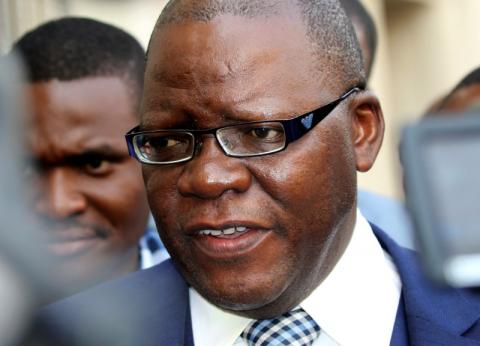Advertisement
Zimbabwe opposition leader charged over post-election violence
HARARE (Reuters) - Zimbabwe's former finance minister and opposition leader Tendai Biti appeared in court on Thursday to be charged with stoking post-election violence in a case watched around the world as a test of President Emmerson Mnangagwa's treatment of opponents.
Biti, whose People's Democratic Party had formed an election alliance with Nelson Chamisa's Movement for Democratic Change (MDC), sought asylum in neighboring Zambia on Wednesday but was deported back to Zimbabwe in a move condemned by the United States.
He was also charged with falsely and unlawfully announcing results of the July 30 election, which Chamisa rejected as fraudulent and is set to challenge in the Constitutional Court on Friday.
If found guilty, Biti could face up to 10 years in jail, a cash fine or both. He was released on bail and will appear in court again on Friday.
"It's been an ordeal, but we survive. We live to fight another day, I am glad to be home," Biti told reporters soon after his release.
The United States said it was concerned about reports of detentions, beatings and other abuses targeting opposition activists. It singled out the case of Biti and signaled that Zambia could face consequences for its role in handing him back.
"We will be discussing this matter with Zambia’s leaders and reviewing certain aspects of our cooperation with the Zambian government," the State Department said in a statement.
The United Nations refugee agency, the UNHCR, said it would be a serious violation of international law if Zambian authorities had handed Biti over despite a court order to the contrary, which his lawyer said had indeed been issued by the Zambian High Court.
The European Union, Australia and Canada also said they were "deeply disturbed by continuing reports that opposition supporters are being targeted by members of the Zimbabwean security forces".
PRESIDENT INTERVENES
Most Zimbabweans had hoped the parliamentary and presidential elections would end the country's pariah status and help usher in an economic recovery. Instead, it has plunged into turmoil reminiscent of contested votes during Robert Mugabe's 37 years of rule until he was ousted by the military last November.
Biti had been in hiding since last week, when six people were killed in a widely condemned army crackdown on protests over the declaration of victory by Mnangagwa's ruling ZANU-PF party.
State prosecutors did not oppose bail for Biti, which was set at $5,000. He was ordered to surrender his passport and title deeds to his house, and banned from addressing political rallies or news conferences until the case is over.
Aware of the potential damage to Zimbabwe's image, Mnangagwa said he had intervened to ensure Biti was released. But he also said that Biti faced serious charges and that the legal process should be allowed to take its course.
"At such a crucial time in the history of the new Zimbabwe, nothing is more important than unity, peace and dialogue. I call on all parties to immediately cease from all forms of incitement to violence," Mnangagwa wrote on his official Twitter page.
Some fear the post-election turmoil will derail the chances of mending an economy facing acute shortages of cash and desperate for foreign investment.
Speaking in court to lawyers and the media, Biti said he had feared being abducted by the security forces. "They wanted to abduct me. I was terrified," he said.
The outspoken politician was also arrested in 2008 for announcing that the late MDC leader Morgan Tsvangirai had won a presidential vote. Official results later showed Tsvangirai beat Mugabe but not by enough votes to avoid a runoff.
(Additional reporting by Tom Miles in Geneva and Lesley Wroughton in Washington; Editing by Mark Trevelyan)



















Add new comment